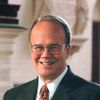MR: In Amusing Ourselves to Death, you have a chapter on the influence of entertainment on religion. Do you think that modernity comes to us in stealthlike fashion, and sometimes Christians and other groups can be naive in viewing style as neutral?
NP: I certainly think that it is a mistake to believe that style is neutral, especially if one means by “style” the form, or forms, in which messages address people. I try to make the point in Amusing Ourselves to Death that the style of television favors and amplifies the entertainment mode. In cases like politics, news, and especially religion, I think that poses a very serious problem, because religion-and Christianity in particular-is a demanding discipline. And although there is joy and exultation that results from religious experience, when we present religion as nothing different from a Broadway show, I think it trivializes and corrupts the religious experience. If there are people who think that it makes no difference how messages are conveyed to people, that one form is just as good as the other, I think these people are underestimating the power of the forms in media.
MR: You emphasize the importance of the printed word in Amusing Ourselves to Death and Technopoly, and one of the things that comes to mind is the sort of shift at the time of the Reformation from the image to the printed page. Do you think it is significant that in our day we’ve gone back to an iconographic sort of medium, especially for those of us who are Jews and Christians who appeal to the written word?
NP: Yes, of course I do believe that. There is a rather rapid movement away from the word and the power of the word toward iconography. One of the more interesting theologians of our time, Jacques Ellul, the French social philosopher who was very much concerned with the religious experience, wrote a book some years ago called the Humiliation of the Word. In it he talks about the very issues you’re raising, and I wonder if we really know what the results of this are going to be. Much of the Judeo-Christian religion, as well as the Judeo-Christian culture that comes to us is based on the idea that through the word we can understand ourselves and our culture. That we the great genius of Greek culture, and Christianity inherited that idea. Sociology, philosophy, anthropology, and psychology, and everything else are somehow within the domain and can be put under control of the word. As culture moves away from the word toward pictures and moving pictures, it would be a new Reformation alright, but that could be a Reformation in reverse that seriously harms our traditional understanding of religion.
MR: A lot of people talk about postmodernism; it seems as if it’s merely in the realm of philosophy and the history of ideas, whereas I think one of the things you pointed out to so many of us is that there are other factors besides intellectual factors that shape the culture. In particular, when we think about postmodernism and its turn inward, involving a distrust of reason and of absolute truth. To what extent is it pushed along by the influence of such media as television and marketing?
NP: Maybe to some extent its roots go further back. I’d say the most pervasive intellectual idea of this century (one finds it in physics, anthropology, psychology, philosophy, almost everything else) is that the form in which we express whatever we have to express about the world controls to some extent what we are saying and what we can see. You find this in (the German physicist) Werner Heisenberg’s remark that we do not see nature as it is, only by the questions we put to it. And you find in linguistics people discovering that different grammatical forms give people different perceptions of how the universe works. Some people say, “We don’t see things as they are but as we are.” It’s this idea which I think is the major thrust of scholarship in our own century.
MR: Would you say that the advent of not only television, but virtual reality, gives us that much more that jibes with our experience, telling us that the postmodern feeling is correct?
NP: I think it is indisputable that this contention that is labeled the “postmodern view” is correct. I think we understand now that how we say things and what instruments we use to measure those things will influence the kinds of results we get. I think we understand that; it represents an advance in human understanding. Nevertheless, that sort of idea can have a psychopathic expression, and the idea that therefore everything is relative and that we cannot know anything is a corrupted extension of that idea.
MR: Will it contribute ultimately to the disintegration of the mind and of high culture?
NP: When you read some of these postmodernists, you would think that’s the direction. However, I think there’s an essential sanity in most people so that they have reality tests. Thank God.
MR: They have to live with their own common sense.
NP: Yes. They know if they want to go from here to there and there’s a mountain in between, they’re going to have a problem. And they know this whether they speak English or Spanish, or anything else. There’s a biological basis after all, to the human condition. We recognize that, and through our engagement with what we call “reality” there are some things we know. I think that will act as a kind of modifying idea so that our intellectual life won’t be destroyed. The fact is that the astrophysicists at NASA were able, by using language and their mathematics, to get some people to the moon. There was nothing arbitrary about that. There may be somewhere in the universe another mathematics that could also have helped us to achieve that. But we can act as if that mathematics is real and as if its structure has some correspondence with the structure of what we call reality. I don’t think that the postmodern thought will in the end destroy intellectual life; I think it adds something to it. If people are not carried to psychopathic extremes about it then I think we’ll be alright.
MR: That sanity that you bring to these subjects is very much in view in Technopoly, in your opening reference to Thamus and Theuth, where one character is so worried about the other’s technology that even the invention of the printed word is perceived as disastrous for its effect on memory and analysis. We can become Luddites, can’t we, rejecting the gifts of God’s providential oversight of technological advances because of a blind commitment to “the old ways”?
NP: I think that would be a mistake, too. I think that we have to recognize that some part of our genius is made manifest in our ability to make these machines and invent technology. And we ought not to disdain that genius. On the other hand, we also know that almost anything we create will cause problems. I think what we don’t need is a point of view that says, “Let’s get rid of the machinery,” which in any case wouldn’t happen, but a point of view that says, “Let’s see if we can exercise some control over it.”
From Amusing Ourselves to Death:
In the eighteenth and nineteenth centuries, religious thought and institutions in America were dominated by an austere, learned, and intellectual form of discourse that is largely absent from religious life today. No clearer example of the difference between earlier and modern forms of public discourse can be found than in the contrast between the theological arguments of Jonathan Edwards and those of, say, Jerry Falwell, or Billy Graham, or Oral Roberts. The formidable content to Edwards’ theology must inevitably engage the intellect; if there is such a content to the theology of the television evangelicals, they have not yet made it known. (1)
From Technopoly:
It is possible that, some day soon, an advertising man who must create a television commercial for a new California Chardonnay will have the following inspiration: Jesus is standing alone in a desert oasis. A gentle breeze flutters the leaves of the stately palms behind him. Soft Mideastern music caresses the air. Jesus holds in his hand a bottle of wine at which he gazes adoringly. Turning toward the camera, he says, “When I transformed water into wine at Cana, this is what I had in mind. Try it today. You’ll become a believer.” (2)
From Amusing Ourselves to Death:
…[Most] of the religion available to us on television is “fundamentalist,” which explicitly disdains ritual and theology in favor of direct communication with the Bible itself, that is, with God. Without ensnaring myself in a theological argument for which I am unprepared, I think it both fair and obvious to say that on television, God is a vague and subordinate character. Though His name is invoked repeatedly, the concreteness and persistence of the image of the preacher carries the clear message that it is he, not He, who must be worshipped. I do not mean to imply that the preacher wishes it to be so; only that the power of a close-up televised face, in color, makes idolatry a continual hazard. Television is, after all, a form of graven imagery far more alluring than a golden calf. I suspect (though I have no external evidence of it) that Catholic objections to Bishop Fulton Sheen’s theatrical performances on television (of several years back) sprang from the impression that viewers were misdirecting their devotions, away from God and toward Bishop Sheen, whose piercing eyes, awesome cape and stately tones were as close a resemblance to a deity as charisma allows.
Television’s strongest point is that it brings personalities into our hearts, not abstractions into our heads. That is why CBS’s programs about the universe were called “Walter Cronkite’s Universe.” One would think that the grandeur of the universe needs no assistance from Walter Cronkite. One would think wrong. CBS knows that Walter Cronkite plays better on television than the Milky Way. And Jimmy Swaggart plays better than God. For God exists only in our minds, whereas Swaggart is there, to be seen, admired, adored. Which is why he is the star of the show. And why Billy Graham is a celebrity, and why Oral Roberts has his own university, and why Robert Schuller has a crystal cathedral all to himself. If I am not mistaken, the word for this is blasphemy. (3)
2 [ Back ] Neil Postman, Technopoly: The Surrender of Culture to Technology (New York: Knopf, 1992), 164
3 [ Back ] Neil Postman, Amusing Ourselves to Death, 122-133.






